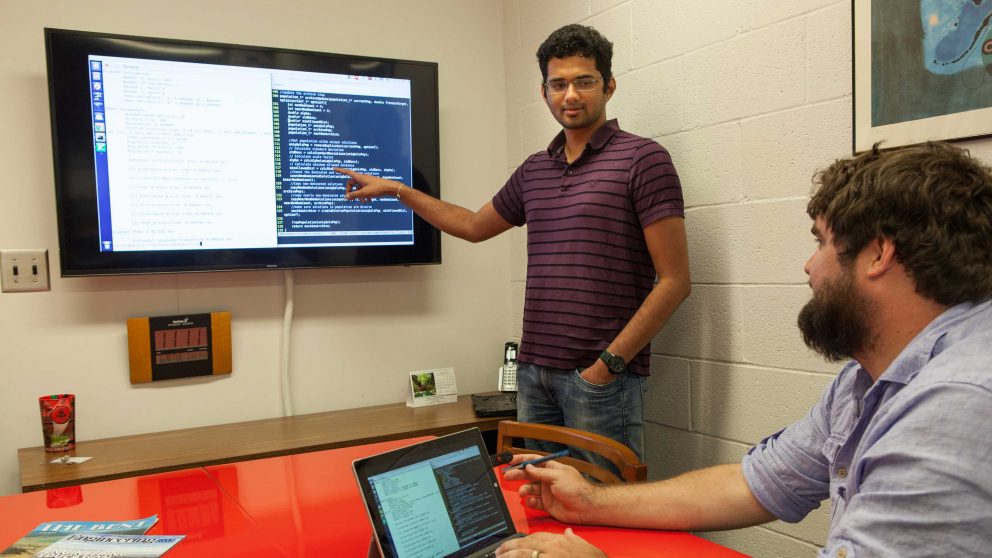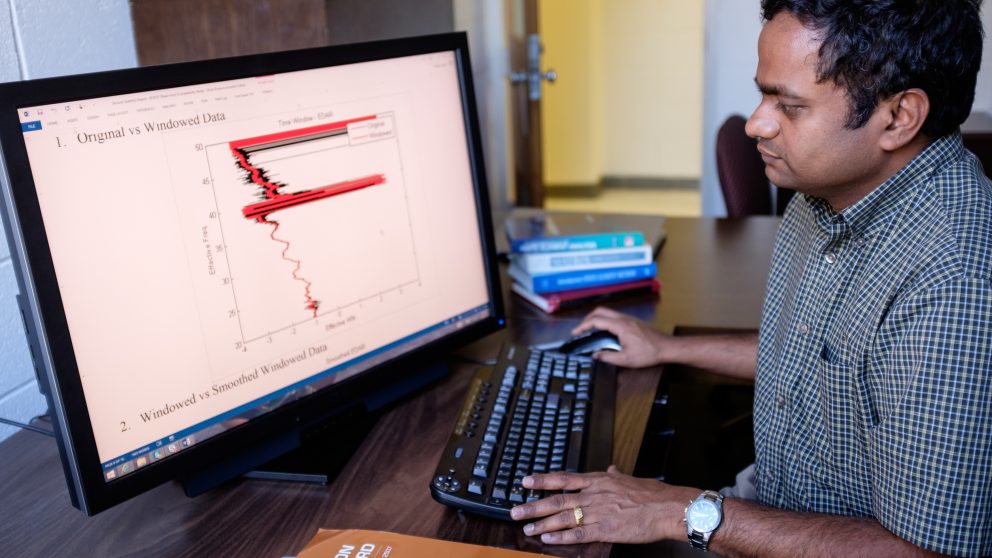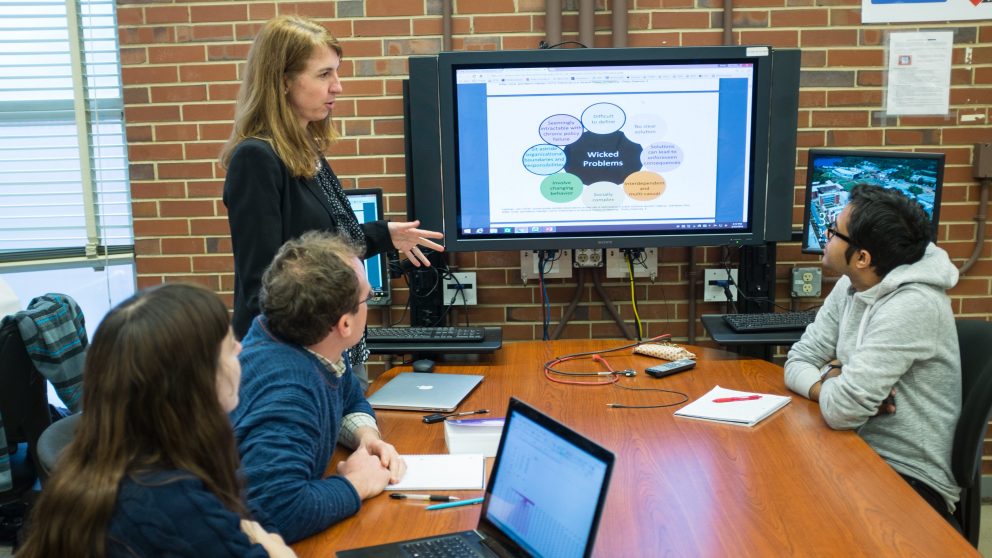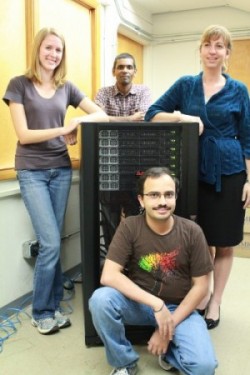Computing and Systems
Explore Our Focus Areas

Systems and Optimization
We develop and apply systems & optimization techniques with a focus on mathematical modeling, search algorithms, decision support systems, stochastic modeling, inverse problems, forecasting and data assimilation, and uncertainty quantification.

High Performance Computing
We develop and apply high performance computing algorithms for computationally intense search and simulation problems with a focus on parallel and distributed computing, concurrent systems, and performance analysis.

Numerical Methods
We focus on developing numerical methods for civil engineering systems including finite element and other discretization methods, particle methods, and solvers.

Software Engineering
We focus on programming methodology, formal approaches for reasoning about computer systems, and verification and validation.
Faculty
| Faculty | Research Specialties |
|---|---|
| Sankar Arumugam | Stochastic methods, Hydroclimatology, Water Resources |
| John Baugh | Software Design, Formal Methods, Scientific Computing, Cyber-Physical Systems |
| Emily Berglund | Complex Systems Analysis, Systems and Optimization, Water Systems Analysis |
| Downey Brill | Systems and Optimization, Mathematical Programming, Environmental and Water Resources Systems Analysis |
| Joseph DeCarolis | Systems and Optimization, Energy Systems Analysis, Uncertainty Analysis |
| Casey Dietrich | Coastal Hydrodynamics, Large-Scale Modeling of Coastal Hazards, Finite elements, High Performance Computing |
| Fernando Garcia | Air pollution modeling, Climate Modeling, High performance computing |
| Murthy Guddati | Computational Mechanics, Inverse Modeling and Optimization, Wave Propagation |
| Ali Hajbabaie | Traffic Engineering, Advanced Traffic Control, Traffic Flow Theory, Traffic Operations |
| Kevin Han | Construction automation and robotics |
| Marc Hoit | Structural optimization, Numerical methods, High performance computing |
| Jeremiah Johnson | Sustainable engineering, Life cycle assessment, and Energy systems analysis |
| Kumar Mahinthakumar | High Performance Computing, Numerical methods, Water Systems Analysis, Groundwater modeling |
| Dan Obenour | Stochastic methods, Water quality modeling, Geospatial modeling |
| Ranji Ranjithan | Systems and Optimization, Heuristic Methods, Water Systems Analysis |
C & S Introductory Video
Related Courses
| Course | Course Number | Credits | Current and Planned Offerings* | |
|---|---|---|---|---|
| Fall | Spring | |||
| Introduction to Numerical Methods for Civil Engineers | CE 536 | 3 | ||
| Computer Methods and Applications | CE 537 | 3 | ||
| Information Technology and Modeling | CE 538 | 3 | ||
| Special Topics in Civil Engineering: Modeling & Analysis of Civil Eng. Systems | CE 590 | 3 | ||
| Special Topics in Civil Engineering Computing | CE 591 | 3 | ||
| Special Topics in Civil Engineering Computing: Design of a Robotic Computer Vision System for Autonomous Navigation | CE/CSC/ECE 592 | 3 | ||
| Advanced Topics in Civil Engineering Computing | CE 791 | 1-3 | ||
| High Performance Computer Modeling | CE 791A | 3 | ||
| Evolutionary Computation | CE 791B | 3 | ||
| Inverse Modeling | CE 791C | 3 | ||
| Advanced Methods for Systems Analysis | CE 791D | 3 | ||
| Modeling Analysis of Environmental Systems | CE 775 | 3 | ||
| Advanced Water Management Systems | CE 776 | 3 | ||
| Stochastic Methods in Water and Environmental Engineering | CE 796 | 3 | ||
| Probabilistic Methods of Structural Engineering | CE 724 | 3 | ||
| Matrix and Finite Element Structural Analysis | CE 721 | 3 | ||
| Dist. = Distance courses offered through Engineering Online.*Note: Course offerings are subject to change.**Note: New courses are offered as CE 591 (“Special Topics”) until they become permanent courses, at which point the course number will change. Students may register by selecting the appropriate section of CE 591. | ||||
Graduate Course Requirements
The Master of Science (MS) degree requires a minimum of 30 semester hours of graduate study including up to 6 credit hours for a thesis and a final oral examination. The Master of Civil Engineering (MCE) degree requires a minimum of 30 semester hours of graduate study without a thesis. The MS and MCE degrees require 15 and 18 credit hours in civil engineering courses respectively, of which 6 hours must be taken from a set of core courses in computing and systems. For more details checkout the advising documents below.
MS degree program in Computing and Systems (advising document)
MCE degree program in Computing and Systems (advising document)
The Doctor of Philosophy (PhD) degree requires 54 credit hours of thesis or course work for students with a prior MS degree or 72 credit hours otherwise. The major component of the Ph.D. program is preparation of a dissertation reporting the results of an original investigation that represents a significant contribution to knowledge. For the PhD degree, consult with your advisor for appropriate courses.
Facilities and Centers
- High Performance Computing Laboratory (CCEE-HPCL)
- Virtual Computing Laboratory (VCL)
- Computing and Systems Collaboratory (CSC)

